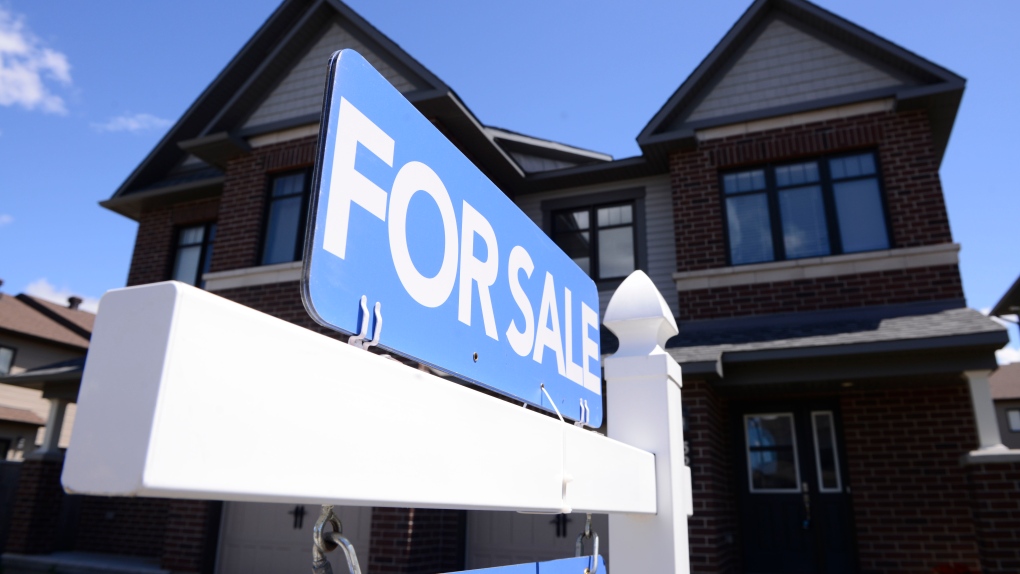Real estate gained momentum in January: Ottawa Real Estate Board
 A new home is displayed for sale, in Ottawa on Tuesday, July 14, 2020. THE CANADIAN PRESS/Sean Kilpatrick
A new home is displayed for sale, in Ottawa on Tuesday, July 14, 2020. THE CANADIAN PRESS/Sean Kilpatrick
The Ottawa Real Estate Board (OREB) says the capital's real estate market thawed in January, but the market is still relatively quiet.
Newly released statistics show 629 homes were sold in January, which is in increase of 16.5 per cent from January 2023. OREB notes that home sales were 10.7 per cent below the five-year average and 3.9 per cent below the 10-year average for the month of January.
“Ottawa’s market activity is seeing positive gains over last year but it’s still a relatively quiet market even by pre-pandemic standards," Curtis Fillier, OREB president, said in a statement.
Fillier says realtors are reporting "lots of showing activity," but it's not translating into higher sales numbers.
“During the pandemic market, buyers had to move quickly and sometimes settle for a property that didn’t check all their boxes. Today, buyers are using the slower market to take the time needed to find their perfect place,” he said. "Sellers would be well-advised to adjust their expectations and thoughtfully consider their pricing and timing strategy."
Meanwhile, Brandon Reay, OREB’s policy and external relations manager says the city’s “market conditions can fluctuate quickly,” given the limited supply when it comes to the number of available houses.
“Ottawa needs more suitable and affordable homes to address the housing crisis, and we need to increase density to meet population demands. We can’t restore and grow upon the market activity Ottawa saw five and ten years ago without more houses for people to buy. OREB recommends direct solutions for meaningful policy change, including streamlining the process at the Ontario Land Tribunal, eliminating exclusionary zoning, and permitting four units on residential lots,” said Reay.
“To meet the aggressive housing targets, we need to close the labour gap with investments in colleges and trade schools. We don’t need any more reactionary and distracting policy, like the federal government’s extension of the foreign buyers ban.”
Here’s how much it cost to buy in Ottawa:
While property prices vary from one neighbourhood to another, OREB says “the average sale price can be useful in establishing trends over time but should not be used as an indicator that specific properties have increased or decreased in value.”
In January 2024, the benchmark price for single-family homes was $703,500, which is an increase of 3.7 per cent on a year-over-year basis in January.
The average price for a townhouse/row unit was $462,200 last month, down 2.1 per cent from the year before.
Meanwhile, the average condominium price has grown by 3.7 per cent from last year to reach $418,500.
Here’s some data about inventory and new listings:
From January 2023, the number of new listings saw an increase of 7.3 per cent. In January 2024, there were 1,271 new residential listings. New listings were 17.5 per cent above the five-year average and 0.8 per cent above the 10-year average for the first month of the year.
At the end of January 2024, active residential listings numbered 1,961 units on the market -- a gain of 4.5 per cent from the end of January 2023.
Active listings were 57.4 per cent above the five-year average and 16.6 per cent below the 10-year average for the month of January.
CTVNews.ca Top Stories

Chants of 'shame on you' greet guests arriving for the annual White House correspondents' dinner
An election-year roast of U.S. President Joe Biden before journalists, celebrities and politicians at the annual White House correspondents' dinner Saturday.
What is a 'halal mortgage'? Does it make housing more accessible?
The 2024 federal budget announced on April 16 included plans to introduce “halal mortgages” as a way to increase access to home ownership.
Here's where Canadians are living abroad: report
A recent report sheds light on Canadians living abroad--estimated at around four million people in 2016—and the public policies that impact them.
Deadly six-vehicle crash on Highway 400 sparked by road rage incident
One person was killed in a six-vehicle crash on Highway 400 in Innisfil Friday evening.
Opinion I just don't get Taylor Swift
It's one thing to say you like Taylor Swift and her music, but don't blame CNN's AJ Willingham's when she says she just 'doesn't get' the global phenomenon.
Invasive and toxic hammerhead worms make themselves at home in Ontario
Ontario is now home to an invasive and toxic worm species that can grow up to three feet long and can be dangerous to small animals and pets.
Harvey Weinstein hospitalized after return to New York from upstate prison
Harvey Weinstein’s lawyer said Saturday that the onetime movie mogul has been hospitalized for a battery of tests after his return to New York City following an appeals court ruling nullifying his 2020 rape conviction.
'We are declaring our readiness': No decision made yet as Poland declares it's ready to host nuclear weapons
Polish President Andrzej Duda says while no decision has been made around whether Poland will host nuclear weapons as part of an expansion of the NATO alliance’s nuclear sharing program, his country is willing and prepared to do so.
Central Alberta queer groups react to request from Red Deer-South to reinstate Jennifer Johnson to UCP caucus
A number of LGBQT+2s groups in Central Alberta are pushing back against a request from the Red Deer South UCP constituency to reinstate MLA Jennifer Johnson into the UCP caucus.
































